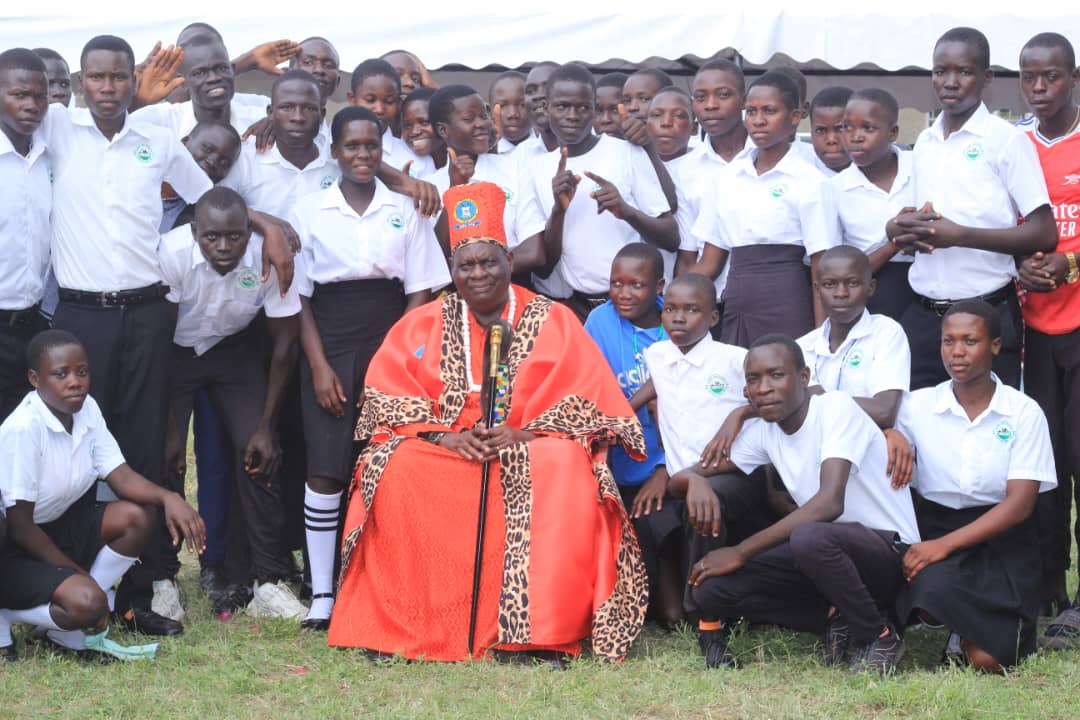
By Nathan Eyagu
Katakwi District – His Highness Emorimor Paul Sande Emolot Etomeileng, the Cultural Leader of the Iteso, has launched a regional education tour across the Teso Sub-region, aimed at revitalizing the education sector, fostering cultural identity among the youth, and addressing systemic challenges facing schools.
The visit is part of a broader agenda under the 10-Year Strategic Plan of the Iteso Cultural Union (ICU), with a strong focus on strengthening education and empowering communities through knowledge, values, and cultural pride.
“Education is the foundation of our future. It is through education that we can restore the dignity and pride of the Iteso people,” Emorimor stated during his visit to Katakwi District.
The Emorimor’s initiative prioritizes monitoring, supervision, and mobilization, with the goal of ensuring learners remain in school and are supported to complete their education. His engagement with school administrators, Boards of Governors, and local education officials is designed to unearth persistent barriers to academic success and collaboratively seek sustainable solutions.
This tour comes ahead of the launch of the Emorimor Education Fund, which aims to support vulnerable learners, improve school infrastructure, and promote equitable access to quality education throughout the region.
At Priscilla Comprehensive Girls Secondary School, a government-aided mixed institution with 1,256 students, Headteacher Ms. Adeko Terressa highlighted serious challenges in infrastructure and staffing. “The school is overcrowded. We operate with only 50 staff members, 18 teachers on the government payroll, 14 employed by the PTA, and the remainder in support roles. Students are forced to learn under trees due to a lack of classrooms. We have no library, inadequate sanitation facilities, and insufficient dormitories,” she reported.
The Chairman of the Board of Governors, Mr. Charles Stephen Okello, added, “We are honored by the Emorimor’s visit. While the school is committed to remaining a center of excellence, persistent challenges—including intermittent water supply and insufficient infrastructure—continue to affect our performance.”
At Magoro Comprehensive Secondary School, a government-aided school with 412 students, Headteacher Mr. Icila Emmanuel noted that, despite limited resources, the school continues to serve its growing population with determination. “We face issues such as high dropout rates due to teenage pregnancies and inadequate scholastic materials. However, this visit by the Emorimor is a strong motivator and a call to action for community investment in education,” he said.
Mr. John Bosco Okiror, the District Inspector of Schools, emphasized the need for urgent government intervention. “Several areas lack adequate government-supported schools. In some parishes, communities have resorted to establishing informal schools while waiting for state support. Notably, Toroma County still lacks a technical institution, unlike Usuk and Ngariam.”
He further cited poverty, poor infrastructure, and environmental degradation as major obstacles to educational progress. “Beyond academic access, we must also promote environmental awareness and tree planting as part of sustainable development,” he added.
The Emorimor’s education tour is widely regarded as a turning point in the region’s approach to education. Through direct engagement and a strategic vision, the initiative aims to elevate academic standards, reduce school dropout rates, and instill a renewed sense of purpose among learners and educators alike.
As the region prepares for the launch of the Emorimor Education Fund this year, stakeholders are hopeful that this bold step will serve as a catalyst for long-term educational transformation and the revival of cultural dignity in Teso.